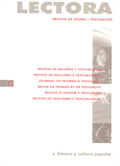Mujer y krausismo
Resum
Krausism became the lead philosophy for Spanish intellectuals during the second half of the 19th century. This philosophy implied the construction of a “New Man” for the regeneration of Spanish society. The creation of this “New Man” relied on the basis of a pedagogical reform. However, Krausists paid also attention to the increasing need of educating women. Nevertheless, the proposals for this pedagogical reform attended in different ways the education for men and women. Mainly due to that traditional sexual politics of subordination were still endured by this philosophy. This aim for educating people gave to the Krausist dramatists the responsibility of transmitting behavioural ideals for men and women, obviously attending to the traditional roles of activity and passivity. Rosario de Acuña, a Spanish dramatist and a Krausist herself, transformed dramatics schemes by giving an active role to the feminine characters. This transformation obeyed to her conviction that women had also to participate in the regeneration of Spanish society so it could be effective. By this means, she proposed the construction of the “New Woman”.Descàrregues
Publicades
Com citar
Número
Secció
Llicència
Els autors i les autores conserven els drets d’autoria i atorguen a Lectora: revista de dones i textualitat el dret de difusió. L'’obra serà disponible simultàniament sota una Llicència de Reconeixement-NoComercial- SenseObraDerivada de Creative Commons que, si no si indica el contari, permet compartir l’obra amb tercers, sempre que aquests en reconeguin l’autoria i la publicació inicial en aquesta revista.
Els autors i autores són lliures de fer acords contractuals addicionals independents per a la distribució no exclusiva de la versió de l’obra publicada a la revista (com ara la publicació en un repositori institucional o en un llibre), sempre que se’n reconegui la publicació inicial en aquesta revista.
S’encoratja els autors i autores a reproduir la seva obra en línia (en repositoris institucionals, temàtics o a la seva pàgina web, per exemple), amb l’objectiu d’aconseguir intercanvis productius i fer que l’obra obtingui més citacions (vegeu The Effect of Open Access, en anglès).





